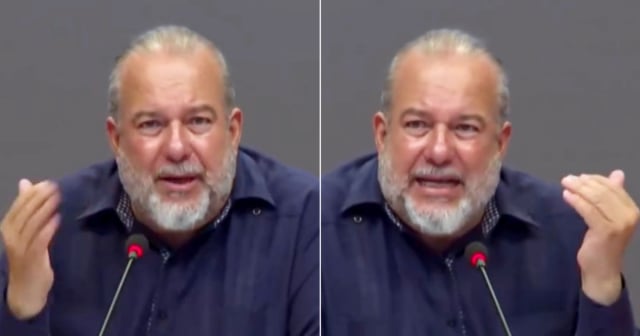Cuban-American congressmen Carlos Giménez and María Elvira Salazar reacted with indignation to the entry into the U.S. of Juan Carlos Santana Novoa, Cuba's Deputy Minister of Labor and Social Security, who sought political asylum this Monday at the Nogales border in Arizona and is currently free, with a court appearance scheduled for August 2026.
"This is a disaster, the border is a disaster," declared Giménez in statements to journalist Daniel Benítez for Univision.
"I don't know the reasons. It needs to be investigated; we will have to send another letter to Secretary Mayorkas to ask why this person entered," he added.
Congresswoman María Elvira Salazar also reacted indignantly, lamenting that he did not choose another country more aligned with his ideology to emigrate to.
"Instead of seeking refuge in Venezuela, Nicaragua, or North Korea, the defenders of Cuban communism knock on the door of the capitalist empire, and unfortunately, the Biden-Harris administration lets them in," he stated in a written declaration sent to the mentioned media outlet.
"It is definitely a failure when it comes to investigating these people, but the hope is that when they apply or when they are presented before the court, the judge determines that they are inadmissible in the United States and sends them back to where they came from," stated lawyer Jesús Novo about the case.
At the end of August, a total of three Republican congressmen and two Republican senators, four of them Cuban-Americans, already sent a joint letter to Secretary of State Antony Blinken and Secretary of Homeland Security Alejandro Mayorkas, asking for an assessment of whether the law was followed in allowing the entry into the U.S. of former Castro leader Manuel Menéndez Castellanos, another of "the infiltrators," and requested that, if it is confirmed that legal provisions were violated, appropriate action be taken.
The signatories of the document were Republican Congress members María Elvira Salazar, Mario Díaz Balart, and Carlos Giménez; and Senators Marco Rubio and Rick Scott.
Juan Carlos Santana Novoa, the fugitive deputy minister
The news of the arrival of Deputy Minister Santana Novoa was reported by Mario J. Pentón based on anonymous government sources, as well as from immigrants who interacted with the high-ranking official without knowing who he actually was.
"We had no idea who that man was until the moment we reached the border and they called him by his name. There were eight Cubans in the group. He was in Tamaulipas and asked us to join him to make the appointment for CBP One," said one of the migrants who accompanied the deputy minister in statements to Martí Noticias.
Another interviewee said that they were always joking with him because they told him "he looked like a Cuban leader," something that turned out to be true.
It also emerged that Santos Novoa had already missed a CBP One appointment for being in Cuba.
The members of the travel group of the deputy minister claim that he was the only person accepted to enter the United States, as the rest were told that their appointment was not at that port.
A Facebook post by the Cuban Embassy in Mexico dated September 4 revealed that Cuba's Deputy Minister of Labor and Social Security intervened that day in the panel titled "Structural Reforms and Longevity" at the I Technical Summit of the American Commissions of Social Security, held in Mexico City.
Santana Novoa is a graduate in Economics, and Google searches about him yield -mysteriously- a brief list of results.
He was appointed Deputy Minister of Labor and Social Security on January 11, 2022, according to the official page of the entity.
The Cuban government continues to remain silent about what happened with the high-ranking Castro official, who joins a growing exodus of leaders, former leaders, judges, prosecutors, and other figures associated with the government who have made their way to the United States through various channels.
The dramatic thing is that there are thousands of citizens from the island in the U.S. who are experiencing a migratory limbo, and many of them are even under an undeserved threat of deportation.
In August, the Patmos Institute, based in Washington, criticized what it described as the alarming increase in the entry into the U.S. of "those responsible for the communist system in Cuba," something that contrasts with many cases of victims on the island who do not have access to a refugee program, which has been stalled for years.
What do you think?
COMMENTFiled under:
